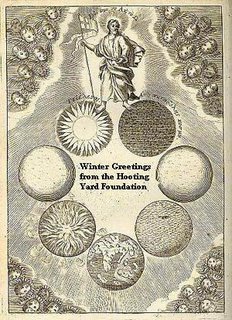The Age of Boosters
One of the most overlooked treasures in the Dobson archive is a etching of the pamphleteer straddling a vast machine. We see him clad in a hide jerkin, a ceremonial Caupochon perched at a jaunty angle atop his mussed head, it's tough crimson chinstrap divides his spectacular beard into two horns. He has a vaguely military air as his raiment is adorned with ribons, ceremonial bells and other dignified nautical gewgaws.
This vehicle on which he rides resembles an over-sized steam-gurney, however one with monstorous unwieldy caterpilar tracks. It is adorned with antennas, klaxons and billowing fins. Parabolic basins with glowing prongs at their centre jut out at absurd angles and at it's base we observe a blazing furnace.
Smoke and vapors billow out of it's fore and aft vents, shrouding the pamphleteer in a stinking miasma. His left-hand is deftly gunning the throttle-hasp of the vast engine, we can only imagine that it is emitting a deafening chugging. His right hand is tugging at one of it's three steering pulleys, the one which activates the suction viscera which is absorbing water from a nearby scum-ridden trough, causing a splendid bronze cisteren to flood.
This vehicle is one of twelve mobile boosting-engines built by Curpin, Todge and Tack at their factory near Hoon. Even though the heraldic-device is partially obscured by the over-full dubbin-tray, we can see that this was one of the last of it's type ever built before Curpin's factory burnt down, succombed poltregeists and was abanoned. Today, the wretched factory is a home for screeching birds and howling wirgos, who whirl and whirr ignorant of the wonders that once made it's soot-blackened foundry the pride of Hoon.
In Denis Beerpint's history of boosting technology, he notes that in 18XX, Dobson fell upon a quandray. Should he enlist with a local boosting brigade or devote his life to pamphleteering: This was an age when gaudy-clad booster technicians achieved great glory, propelling their mighty whirling boosting engines to any place on earth that needed their assistance. It was an age when their dairing-do and exploits filled pages of speculative fiction, when fleets of boosters set upon dangerous errands, uplifting all that was languid and flaccid. It was an age in which those boosting technicians were regarded as Gods.
Gods they may have been, but all that is holy is eventually profaned – or at least so claimed Marx. The glory days of boosters, are long since over, and those brave men who piloted their rickety boosters are all but forgotten. All victims of progress:
The boosting engine gave way to the portable booster – a lamentably shoddy construct of plastic and zinc. The brave booster-pilots found themselves made redundant by the unwashed hordes of private booster platoons. Later still, transistorised pocket boosters were the rage – a technological marvel that pomised a booster in every child's satchel. Today a simple viscous fluid serves much the same purpose of the vast stinking engines of old. Can we call this progress?
In his dotage, Dobson was want to lament the demise of the booster. He never lived to witness today's wonders but he could surely see the future of Boosting, prophetic as ever, I would suggest you read: “How I almost enlisted with my local Boosting Brigade, and the implausible yet hilarous events which subsequently occurred”. Sadly, this pamphlet, like all Dobson tracts is long, long out of print.



